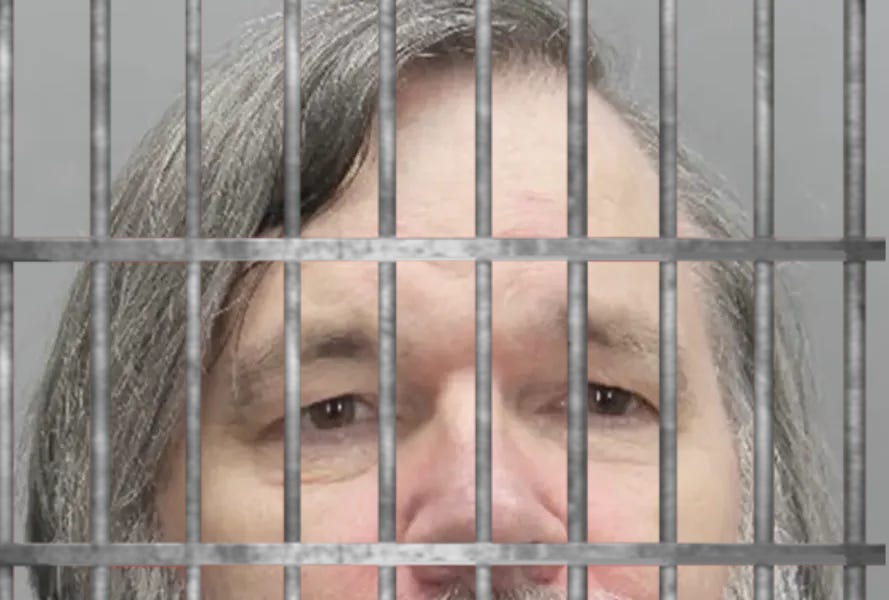
“And it turns out, I did find out that Judge [Gerald L.] Harmon, the pre-trial judge, had agreed 'he had served enough time,' he would only impose a sentence of time served. So if they would have gone and got the plea, I would have gone home, and then I could have appealed it. It would have been over. But now everything's off the table.”
-Paul Boyne
NOTE: This is a version of an article first published as part of the Frank Report’s ongoing coverage of Connecticut’s Paul Boyne prosecution.
By Richard Luthmann
Virginia blogger Paul Boyne is facing 18 counts of stalking and electronic stalking for blog posts on his Family Court Circus website. He has been a resident of the Connecticut Corrections Department since last summer. Boyne believes the Family Courts are controlled by a Jewish conspiracy he’s referred to as “The Jewdiciary,” and influenced by the Anti-Defamation League (ADL).
Nonetheless, Boyne claims his speech is protected under the First Amendment - and many civil libertarians, free press advocates, casual observers, and this journalist agree. As misguided as some of the content of his Family Court Blog is, his reporting is newsworthy and should receive free press and free speech protections.
Boyne spoke with in a series of conversations beginning on Tuesday night. He says his court-appointed Connecticut attorneys from the Manchester-based Kirschbaum Law Group, LLC, betrayed him at the last moment. They derailed a plea deal that would have allowed him to walk free on Monday.
The judge had been prepared to sentence Boyne to time served, which would have meant his release that day. Instead, he says his Connecticut court-appointed lawyers, Jennifer M. Buyske and Alice M. Osedach Powers, blindsided him with a competency claim.
By raising the issue of Boyne's mental competency to stand trial and potential disability, he was legally precluded from taking a plea deal.
Boyne believes this was a deliberate move to delay the trial and keep him incarcerated.
Boyne denied the lawyers’ claims and detailed his frustrations. He says the “fix” was in, and baseless incompetency to stand trial claim ensures he will stay behind bars.
“I was ready to plead out to anything,” Boyne said. “I told my lawyer I’d even admit to being the gunman on the grassy knoll just to get out of jail. But instead of letting me go, they claimed I was incompetent. It killed the deal.”
Boyne believes that the lawyers are deliberately tanking his case.
“They had already agreed to time served,” Boyne said. “I was ready to plead, the judge was ready to let me go, and then my lawyers claimed I was incompetent. It was over in five minutes.”
The claim of incompetence stemmed from, among other things, a concussion Boyne suffered in jail during an altercation with another inmate in August. Boyne says the injury had no impact on his mental state or ability to understand the proceedings, but his lawyers used it as a pretext to delay the trial and keep him locked up.
In Godinez v. Moran, the U.S. Supreme Court held “the standard for competence to stand trial is whether the defendant has 'sufficient present ability to consult with his lawyer with a reasonable degree of rational understanding' and 'has a rational as well as factual understanding of the proceedings against him,'" quoting from Dusky v. U.S.
Godinez applies the same competency criteria to a defendant pleading guilty. In Drope v. Missouri, SCOTUS said, "A person whose mental condition is such that he lacks the capacity to understand the nature and object of the proceedings against him, to consult with counsel, and to assist in preparing his defense may not be subject to a trial."
In Connecticut, the state’s High Court has adopted the standard set forth in §54-56d(a), saying it conformed to the standard in Dusky. The courts apply that standard to the issue of whether the defendant in the case before it is competent to plead guilty. See Myers v. Manson.
Connecticut General Statutes § 54-56d(a) states:
(a) Competency requirement. Definition. A defendant shall not be tried, convicted or sentenced while the defendant is not competent. For the purposes of this section, a defendant is not competent if the defendant is unable to understand the proceedings against him or her or to assist in his or her own defense.
Many, including journalist Michael Volpe, believe that Boyne’s lawyer’s claims of incompetence to stand trial are “shenanigans,” dishonest, and pretextual.
Legal scholars like Professor Michael L. Perlin, a foremost expert on mental disability and the law, claim that court actors involved in advancing pretextual claims of mental illness perpetrate an insidious form of bias and bigotry:
“Sanism,” an irrational prejudice against people with mental illness, is of the same quality and character as other irrational prejudices such as racism, sexism, homophobia, and ethnic bigotry that cause (and are reflected in) prevailing social attitudes. It infects both our jurisprudence and our lawyering practices. Sanism is largely invisible and largely socially acceptable. It is based predominantly upon stereotype, myth, superstition, and deindividualization and is sustained and perpetuated by our use of alleged “ordinary common sense” (OCS) and heuristic reasoning in irrational responses to events in both everyday life and the legal process. Michael L. Perlin, JD, “Sanism and the Law,” American Medical Association Journal of Ethics October 2013, Volume 15, Number 10: 878-885.
Boyne believes his lawyers’ claims are not genuine. He says they are an effort to discredit and silence him.
“They’re not defending me,” Boyne said. “They’re working against me.”
If attorneys Buyske and Osedach Powers raised a baseless claim of incompetency, they could face serious ethical charges. The Connecticut Rules of Professional Conduct Rule 8.4(7) went into effect in 2022. It states:
RULE 8.4. MISCONDUCT
It is professional misconduct for a lawyer to:
(7) Engage in conduct that the lawyer knows or reasonably should know is harassment or discrimination on the basis of race, color, ancestry, sex, pregnancy, religion, national origin, ethnicity, disability, status as a veteran, age, sexual orientation, gender identity, gender expression or marital status in conduct related to the practice of law. This paragraph does not limit the ability of a lawyer to accept, decline or withdraw from a representation, or to provide advice, assistance or advocacy consistent with these Rules.
A lawyer who, in the course of representing a client, knowingly manifests by words or conduct, bias or prejudice based upon race, sex, religion, national origin, disability, age, sexual orientation, or socioeconomic status, violates Rule 8.4(7) when such actions are prejudicial to the administration of justice.
Boyne was lined up to walk out of jail on Monday. Because of his lawyer’s pretextual claims of his “mental disability,” Boyne will remain incarcerated for months if not years.
The Commentary Connecticut rule states, “Discrimination and harassment in the practice of law undermine confidence in the legal profession and the legal system.”
We made a detailed request for comments from Attorneys Buyske and Osedach Powers before publication. As of press time, they have not responded.
Now facing an indefinite delay while a competency evaluation is conducted, Boyne says the entire process is a tactic to prolong his detention and pressure him into a worse plea deal. He remains determined to fight the charges, but his frustration with his legal team, who appears to have sold him up the river, and the legal system protecting the “Judge-Victims” of his blog posts is growing.
“I should have walked out of that courtroom on Monday,” Boyne said. “Instead, I’m still sitting in jail because of my lawyers.”
The full transcript of this first conversation is below.
Richard Luthmann
Hey, Paul, how are you? I'm watching the debate. They're going back and forth. You watching it where you are?
Paul Boyne
I wouldn't watch it if I was at home. I wanted to call real quick. It turns out my lawyer is hopping mad that Mike Volpe is saying that she's ineffective counsel. I tell you, it's hilarious. But the fun thing was, I was able to stand up in front of Judge Brown and tell him about the injunction I filed in federal court, and that he had duty under the Supremacy Clause in the 14th Amendment to seek a declaratory judgment under Dombrowski. At which point he said, basically he didn't want anything to know about the federal case. At which point I said, 'So you're telling me the 14th Amendment doesn't apply in your courtroom?' And he said, 'No, that's not what I said. Now sit down, Mr. Boyne,' so that ended.
Paul Boyne
But supposedly, the interpretation of Article First, Section Eight [of the Connecticut Constitution], about 'heard by himself and by counsel doesn't apply' in the courts. They say you have an attorney representative; you're represented, so fuck off. But anyway, I just want to go over a couple of things if you're going to be around tomorrow, suggesting a time to call.
Richard Luthmann
Well, let's go now. What happened with this incompetent-to-stand trial stuff? Talk to me here.
Paul Boyne
Oh, well, that was my counsel's wildcard. The plea is out and the trial is out. That's the way it works.
Richard Luthmann
So they're saying that you're incompetent to stand trial at this point, and they want to get you evaluated. Is that what they're saying?
Paul Boyne
Yeah.
Richard Luthmann
So tell me what happened in the court that led up to this.
Paul Boyne
Nothing. My attorneys met with me before the hearing, which was supposed to be a motion to suppress and a motion to dismiss. And Alice Powers went off begging to be fired, claiming I argue too much, and I don't understand. And then she launches into this concern about the competency. And then she tells the judge that I have a concussion, and I believe [former Connecticut Supreme Court Justice and DCF Commissioner] Joette Katz is involved, and that it had already been arranged. It was a five minute hearing.
Richard Luthmann
So wait a second. They said that you had, is it true that you have a concussion?
Paul Boyne
Yes, I got assaulted by my previous bunkie.
Richard Luthmann
Okay, how long ago was that?
Paul Boyne
The 25th of August.
Richard Luthmann
So they're saying that the concussion that you received from an assault on August 25 has rendered you incompetent to stand trial at this point?
Paul Boyne
She didn't say that. She just said he has a concussion. I mean, she was just throwing mud at the wall, and it didn't matter. And then the judge said, 'Okay, I order the evaluation.'
Richard Luthmann
So the judge ordered an evaluation, and so they've stopped everything. Now, the trial was supposed to be this month coming up, and now there's no speedy trial. It's an unlimited time they can take right now to do this evaluation, and they could just turn the screws on you, because they have you in a spot where they can just try to get you to sign on the dotted line, where they can further torture you where you are and use this evaluation for competency as a pretext. Is that, is that a fair characterization?
Paul Boyne
You've got it. It's a page right out of the Nutmeg Playbook. They pull it on people all the time.
Richard Luthmann
Do you believe the reason why they're doing this is that they don't have any evidence, and they're trying to make sure that you don't question these judges on the stand at trial?
Paul Boyne
Well, number one, my lawyers weren't ready for trial. And number two, we don't even know what the nature and cause of the accusations are. We have no particulars. And and then I was just trying to plead out. I mean, I even told my lawyer, I said, 'I'll plead out to being the gunman on the grassy knoll.' And she says, 'Well, I don't think we understand the charges against you.' And I said, 'Yeah, I understand stalking is bullshit. So let's plead out, and I'm going home.'
Paul Boyne
And it turns out, I did find out that Judge [Gerald L.] Harmon, the pre trial judge, had agreed 'he had served enough time,' he would only impose a sentence of time served. So if they would have gone and got the plea, I would have gone home, and then I could have appealed it. It would have been over. But now everything's off the table.
Richard Luthmann
So you had a chance potentially, and you were willing to say whatever they wanted you to say, even though you believe that you didn't commit a crime, but you're willing to go in there on Monday and say anything they wanted to say, so you could walk out of jail?
Paul Boyne
Exactly. Anyway, if you're gonna be around tomorrow, we can go over it in finer detail. I just thought it should be before we went to bed here and in the zoo.
Richard Luthmann
Yeah, we'll talk tomorrow. I want to talk more about this, and I think that I want to hear from you about your feelings on this and the whole thing that happened on Monday.


















Share this post